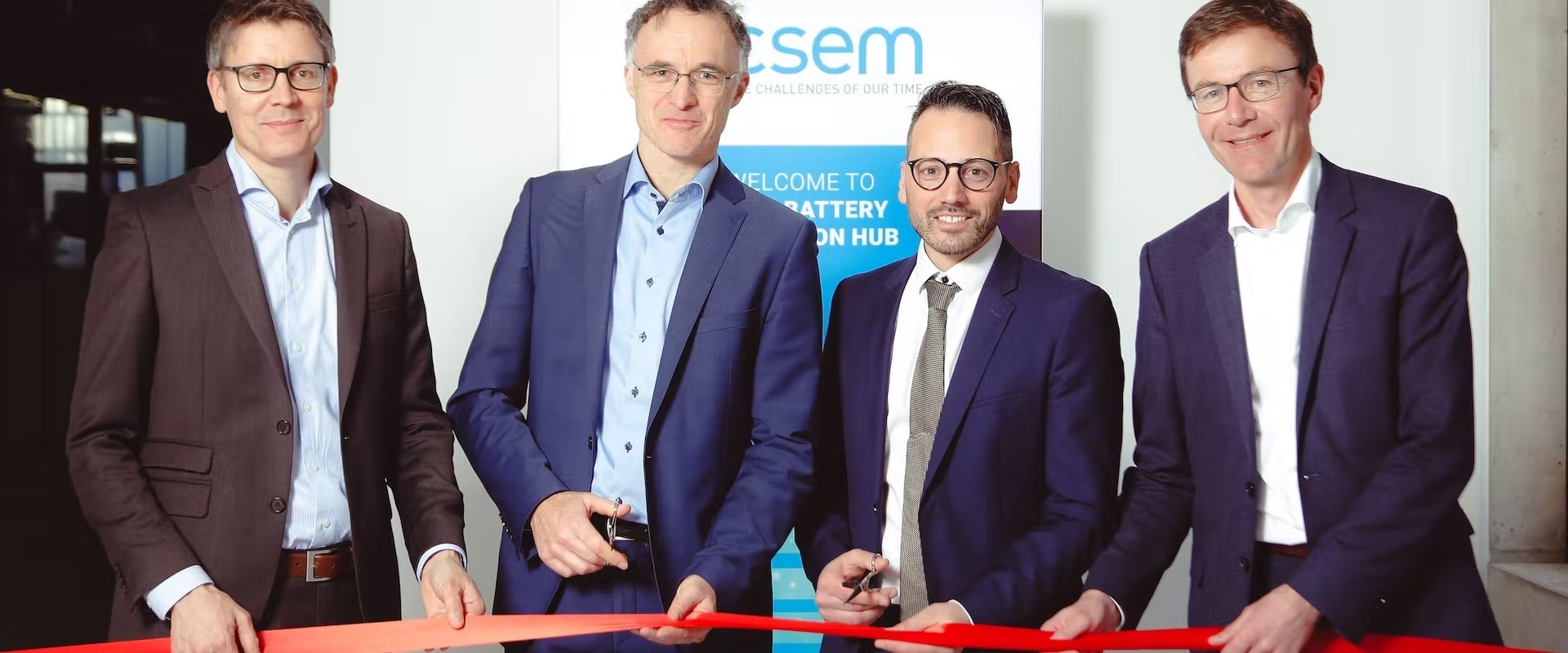From CSEMReviewed by Maria OsipovaFeb 16 2023
Yesterday, 80 handpicked guests inaugurated CSEM's new Battery Innovation Hub (BIH) in Neuchâtel. At the site, interdisciplinary teams will work on the "battery of tomorrow" in close partnership with local companies. This facility is the only one of its kind in the country – and is therefore an important guarantee for Switzerland's competitiveness.
 Battery Innovation Hub inauguration : (from left to right) Alexandre Pauchard (CSEM, CEO), Andreas Hutter (CSEM, Group Leader Energy Systems), Andrea Ingenito (CSEM, Group Leader Sustainable Energy) and Pierre-Alain Leuenberger (Neuchâtel Cantonal Bank, General Director). Image Credit: © CSEM.
Battery Innovation Hub inauguration : (from left to right) Alexandre Pauchard (CSEM, CEO), Andreas Hutter (CSEM, Group Leader Energy Systems), Andrea Ingenito (CSEM, Group Leader Sustainable Energy) and Pierre-Alain Leuenberger (Neuchâtel Cantonal Bank, General Director). Image Credit: © CSEM.
According to the joint study by the European Patent Office and the International Energy Agency, by 2040 the world will need energy storage solutions equivalent to 50 times the current market capacity. As a result, the race to develop the "battery of tomorrow" is already in full swing. This has direct repercussions on the Swiss economy. As a major supplier to the European industry (particularly its automotive sector), the country must also gear up for the electric future and reposition itself. Batteries will also play an increasingly important role in managing electricity networks. In order to support the Swiss industry in this transformation, CSEM, with the support of the Cantonal Bank of Neuchâtel, has therefore extended its research priorities to the world of batteries.
Switzerland is Jostling for Its Position in the Battery Race
Asia currently produces 90% of the batteries used in the world. "Europe must no longer remain in this state of dependency. In Switzerland, we also have the skills to be at the forefront of battery development and innovation," explains Andreas Hutter, Group Leader Energy Systems at CSEM. Thanks to the BIH, interdisciplinary teams (from fields of chemistry, physics, and engineering in various disciplines, among others) will be working on the important topic of batteries at a site measuring 400 square meters. What's more, by 2026 more than 50 people should be working in this center with a unique scope of action based in Switzerland. Indeed, by combining the development of new chemistries and interfaces with the analysis and intelligent control of batteries, CSEM is, for the first time, covering the entire value chain under one roof.
CSEM: 10 Years of Success in the Sustainable Energy Sector
It is no coincidence that CSEM has taken the lead in the field of sustainable energy storage. Its energy innovation program started in 2013, and it's partnership with EPFL, has made it, among other things, one of the most renowned photovoltaic technology centres, thanks to achieving several world records for solar cell efficiencies while also providing the industry with several solutions. "With our new facilities, we're expanding the existing battery landscape in Switzerland and making it more competitive," explains Christophe Ballif, VP Sustainable Energy at CSEM.
Exciting Projects in the Pipeline
An important intermediate objective of this work will be to create the next generation of batteries. "Our challenge is to develop disruptive technologies that make batteries more powerful and durable, with improved safety and ideally lower cost to make the European industry more competitive" said Andrea Ingenito, Sector Head of Coatings for Energy Devices at CSEM. To achieve this, CSEM experts are working both on direct battery improvement, for example by modifying the properties of the interfaces inside batteries, and on battery management via electronics that ensure safe operation, where a combination of non-invasive detection and local control guarantees optimal aging and longevity of the systems. Thanks to the greater number of charge cycles that can be used, and the ease of recycling, the ecological impact and cost of batteries are minimized, while increasing safety. However, CSEM's mission to act as a bridge between academia and industry goes even further. "This transfer of knowledge and technology can enable local companies to open up alternative paths and use their expertise in the promising new battery environment," explains Andreas Hutter. The expert cites the examples of the Swiss company Bühler, one of the world's leading suppliers of machines for the agrifood industry, which now also supplies the battery industry, Kyburz, the supplier of electric scooters used by the Swiss Post Office, and Libattion, a start-up that gives a second life to batteries. The company uses procedures established by CSEM teams to qualify batteries from electric bikes for reuse in industrial machines.